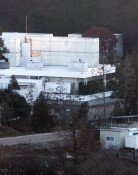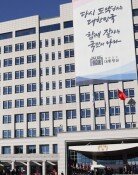11 More Nuke Plants to Be Built by 2030
11 More Nuke Plants to Be Built by 2030
Posted August. 14, 2008 06:32,
The government by 2030 will build 11 more nuclear power plants and increase the share of such reactors in the nations power generation facilities to 41 percent.
New and renewable energy will account for 11 percent of energy consumption, up from 2.2 percent in 2006, and self-production of gas and oil will make up 40 percent of energy consumption from 3.2 percent two years ago.
The government announced its plan at the Center for Small and Medium Businesses in central Seoul yesterday.
According to the Framework Act on Energy, the government must set an energy plan every five years, and the plan released yesterday will be confirmed at the third National Energy Committee led by President Lee Myung-bak slated for the end of this month.
The plan involves making nuclear power plants to account for 41 percent of power generation facilities by 2030, up from 26 percent in 2006.
A source from the Knowledge Economy Ministry said, Given surging oil prices and the ever-strengthening global regulations on greenhouse gas emissions, nuclear power production is the most practical solution. Since nuclear energy ensures a stable supply of cheap and clean energy, it is critical to providing clean energy sources.
To increase the share of nuclear power facilities as planned, 11 nuclear power plants will be built to provide 1.4 million kilowatts of energy. If the new reactors are built as scheduled, atomic power will account for 59 percent of national power generation, up from 35.5 percent now.
Given the 12 years needed for the process, from selecting sites to completing construction, the government will land on which the reactors will be established by 2010. A few proper sites for nuclear plants will be selected soon.
As temporary storehouses for spent nuclear fuel, a type of high-level radioactive waste, are expected to be saturated by 2016, officials will discuss tackling the matter from the second half of this year.
While trying to provide more new and renewable energy sources, the government will foster the alternative energy industry covering solar, wind, hydroelectric and fuel cell power as Koreas next-generation growth engine.
To encourage reasonable energy consumption, the energy plan also includes measures to change the electricity charging system, which provides electricity at different prices depending on consumption purpose (general, household or industrial) to a new system that sets rates depending on the supply cost.
cha@donga.com tesomiom@donga.com







